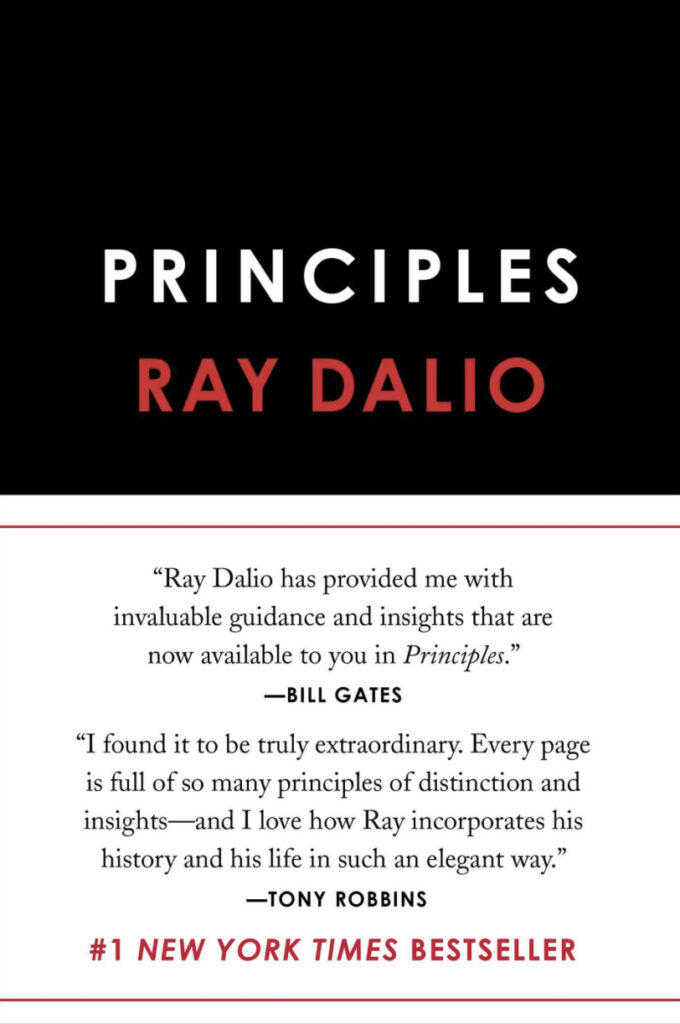Principles describes a foundational approach to continually learning as an adult by embracing helpful signals (such as pain and discomfort) that typically hinder us. While investment titans are often characterized as smug egomaniacs, Ray portrays the opposite, emphasizing the key to his success as routinely seeking others to teach him what is actually true rather than assuming he already knows it all. While Ray’s background is in investments and corporate management, many of his principles can be applied to everyday life. He inspired me to begin crafting my own principles which have partial influenced the creation of this blog.
You should read this book if you…
- are interested learning how to embrace and benefit from your challenges and setbacks
- want to improve on how you make difficult decisions
- seek a way to create your own set of guidelines for how best to approach your work and life
Additional Information
Year Published: 2017
Book Ranking (from 1-10): 10 – Superb – Changed the way I live my life
Ease of Read (from 1-5): 4 – Moderately challenging
Key Highlights
Principles – Life
- Before I begin telling you what I think, I want to establish that I’m a “dumb shit” who doesn’t know much relative to what I need to know. Whatever success I’ve had in life has had more to do with my knowing how to deal with my not knowing than anything I know. The most important thing I learned is an approach to life based on principles that helps me find out what’s true and what to do about it
- None of us is born knowing what is true; we either have to discover what’s true for ourselves or believe and follow others. The more open- minded you are, the less likely you are to deceive yourself— and the more likely it is that others will give you honest feedback
- While mankind is very intelligent in relation to other species, we have the intelligence of moss growing on a rock compared to nature as a whole. We are incapable of designing and building a mosquito, let alone all the species and most of the other things in the universe. So I start from the premise that nature is smarter than I am and try to let nature teach me how reality works
- I now realize that nature optimizes for the whole, not for the individual, but most people judge good and bad based only on how it affects them. What I had seen was the process of nature at work, which is much more effective at furthering the improvement of the whole than any process man has ever invented
- There is no avoiding pain, especially if you’re going after ambitious goals. Believe it or not, you are lucky to feel that kind of pain if you approach it correctly, because it is a signal that you need to find solutions so you can progress
- Distinguish between you as the designer of your machine and you as a worker with your machine. One of the hardest things for people to do is to objectively look down on themselves within their circumstances (i.e., their machine) so that they can act as the machine’s designer and manager. Most people remain stuck in the perspective of being a worker within the machine. If you can recognize the differences between those roles and that it is much more important that you are a good designer/ manager of your life than a good worker in it, you will be on the right path
- Most of life’s greatest opportunities come out of moments of struggle; it’s up to you to make the most of these tests of creativity and character
- Almost nothing can stop you from succeeding if you have a) flexibility and b) self- accountability. Flexibility is what allows you to accept what reality (or knowledgeable people) teaches you; self- accountability is essential because if you really believe that failing to achieve a goal is your personal failure, you will see your failing to achieve it as indicative that you haven’t been creative or flexible or determined enough to do what it takes. And you will be that much more motivated to find the way
- View painful problems as potential improvements that are screaming at you. Though it won’t feel that way at first, each and every problem you encounter is an opportunity; for that reason, it is essential that you bring them to the surface
- Recognize that it doesn’t take a lot of time to design a good plan. A plan can be sketched out and refined in just hours or spread out over days or weeks. But the process is essential because it determines what you will have to do to be effective. Too many people make the mistake of spending virtually no time on designing because they are preoccupied with execution. Remember: Designing precedes doing!
- The two biggest barriers to good decision making are your ego (difficulty accepting your mistakes and weaknesses) and your blind spots. Together, they make it difficult for you to objectively see what is true about you and your circumstances and to make the best possible decisions by getting the most out of others
- Radical open-mindedness is motivated by the genuine worry that you might not be seeing your choices optimally. It is the ability to effectively explore different points of view and different possibilities without letting your ego or your blind spots get in your way. It requires you to replace your attachment to always being right with the joy of learning what’s true. Most people make bad decisions because they are so certain that they’re right that they don’t allow themselves to see the better alternatives that exist
- When two people believe opposite things, chances are that one of them is wrong. It pays to find out if that someone is you through thoughtful disagreement. In thoughtful disagreement, your goal is not to convince the other party that you are right— it is to find out which view is true and decide what to do about it
- Open-minded people can take in the thoughts of others without losing their ability to think well— they can hold two or more conflicting concepts in their mind and go back and forth between them to assess their relative merits
- The best choices are the ones that have more pros than cons, not those that don’t have any cons at all. Watch out for people who argue against something whenever they can find something— anything— wrong with it, without properly weighing all the pluses and minuses
- In case of a disagreement with others, start by seeing if you can agree on the principles that should be used to make that decision. This discussion should include exploring the merits of the reasoning behind the different principles
Principles – Work
- Nothing is more important or more difficult than to get the culture and people right
- Idea Meritocracy = Radical Truth + Radical Transparency + Believability-Weighted Decision Making
- Don’t feel bad about your mistakes or those of others. Love them! People typically feel bad about their mistakes because they think in a shortsighted way about the bad outcome and not about the evolutionary process of which mistakes are an integral part
- Spend lavishly on the time and energy you devote to getting in sync, because it’s the best investment you can make. In the long run, it saves time by increasing efficiency, but it’s important that you do it well. You will need to prioritize what you are going to get in sync about and who you are going to get in sync with because of time constraints. Your highest priority should be the most important issues with the most believable and most relevant parties
- 1+1 = 3 but 1+1+1+1+1 > 20. Three to five smart people will generate the most optimal answers
- In typical organizations, most decisions are made either autocratically, by a top-down leader, or democratically, where everyone shares their opinions and those opinions that have the most support are implemented. Both systems produce inferior decision making. That’s because the best decisions are made by an idea meritocracy with believability-weighted decision making, in which the most capable people work through their disagreements with other capable people who have thought independently about what is true and what to do about it
- Don’t pay as much attention to people’s conclusions as to the reasoning that led them to their conclusions
- The most important thing you can do is understand that hiring is a high-risk gamble that needs to be approached deliberately. A lot of time, effort, and resources go into hiring and developing new employees before it’s clear whether or not they are good fits. Remember that people tend to pick people like themselves, so choose interviewers who can identify what you are looking for
- The greatest gift you can give someone is the power to be successful. Giving people the opportunity to struggle rather than giving them the things they are struggling for will make them stronger
- Understand that a great manager is essentially an organizational engineer. Great managers are not philosophers, entertainers, doers, or artists. They are engineers. They see their organizations as machines and work assiduously to maintain and improve them. Great managers orchestrate rather than do. Like the conductor of an orchestra, they do not play an instrument, but direct their people so that they play beautifully together
- Develop a full profile of each person’s values, abilities, and skills. These qualities are the real drivers of behavior, so knowing them in detail will tell you which jobs a person can and cannot do well, which ones they should avoid, and how the person should be trained. These profiles should change as the people change
- The most common mistake I see people make is dealing with their problems as one- offs rather than using them to diagnose how their machine is working so that they can improve it

Discover more from The Broader Application
Subscribe to get the latest posts sent to your email.
